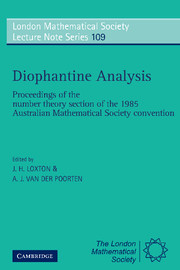 Diophantine Analysis
Diophantine Analysis Published online by Cambridge University Press: 05 April 2013
The third Australasian Mathematics Convention was held at the University of New South Wales from the 13th to the 17th of May 1985. The number theory section was particularly active and distinguished. The contributions collected in this volume give an overview of the field of Diophantine Analysis and a guide to problems of current interest in this area.
The papers of Dale Brownawell and Daniel Bertrand are concerned with transcendence methods. In recent times, the classical theory of transcendence has been enriched by a number of techniques from algebraic geometry. One of these is Nesterenko's use of integral Chow forms to obtain transcendence measures. Dale Brownawell gives a down-to-earth introduction to the machinery of Chow forms and shows how it can be used to investigate questions of simultaneous approximation of values of the exponential function at algebraic points. Daniel Bertrand discusses the problem of giving lower bounds for the distance between points of finite order on an abelian variety. Such bounds can be obtained both by l-adic methods and by transcendence arguments combined with the deep results of Masser and Wustholz on zero estimates on group varieties. This circle of ideas includes an analogue of Baker's theorem for linear forms in generalised logarithms and offers the hope of improved lower bounds for linear forms.
To save this book to your Kindle, first ensure no-reply@cambridge.org is added to your Approved Personal Document E-mail List under your Personal Document Settings on the Manage Your Content and Devices page of your Amazon account. Then enter the ‘name’ part of your Kindle email address below. Find out more about saving to your Kindle.
Note you can select to save to either the @free.kindle.com or @kindle.com variations. ‘@free.kindle.com’ emails are free but can only be saved to your device when it is connected to wi-fi. ‘@kindle.com’ emails can be delivered even when you are not connected to wi-fi, but note that service fees apply.
Find out more about the Kindle Personal Document Service.
To save content items to your account, please confirm that you agree to abide by our usage policies. If this is the first time you use this feature, you will be asked to authorise Cambridge Core to connect with your account. Find out more about saving content to Dropbox.
To save content items to your account, please confirm that you agree to abide by our usage policies. If this is the first time you use this feature, you will be asked to authorise Cambridge Core to connect with your account. Find out more about saving content to Google Drive.